bigtree
bigtree's JournalFull Circle
...that's where I believe we've come in this Obama presidency.
As we reflect-on, revel-in the final day of this presidency, many of us are coming to terms with the fact that most of the fights we waged along with President Obama will need to be fought and defended all over again in the Trump presidency. As resolute as ever on this important day, I take great pride in the successive elections of Barack Obama, and depart from this historic moment in time with much the same message I imparted when we began this enterprise.
In very much the same spirit as my 'flashback' posts this week, I want to express, one last time, perhaps, my appreciation for all the folks who worked so hard to make this possible in my lifetime, by sharing what I wrote in 2009.
Good luck, best regards, and best wishes to all of us.
_________________________________
A Leader in the White House

In electing Barack Obama, America advanced an authentic leader to the White House.
Although he's an accomplished academic - a former president of the Harvard Law Review; though he's served in the Illinois State Legislature and in the Senate; Mr. Obama's most productive and important qualification is his skill in inspiring and organizing which began with the choice he made after college to go into the communities and work to bring people together to help make a positive difference in their surroundings and in their lives.
Hope is the mantra he's chosen as his organizing point. Throughout his previous campaign and election, and the present one, Mr. Obama has been ridiculed and even scorned for promoting that one motivating principle, as if that represented the totality of his platform and initiatives. Hope can't feed the hungry, care for the sick and injured, end wars . . . but Mr. Obama wants us to believe in our ability to come to solutions and remedies for these issues and concerns by facing them together without the obstructing veils of cynicism and corrupting self-interest.
As his inauguration unfolded alongside the celebration of the birthday of Martin Luther King, Jr., Mr. Obama's message of hope reminded us of the nation's reaction to the 'dream' that King expressed in his address at the Lincoln Memorial at the end of the March on Washington.
Martin Luther King, Jr. will always own that moment where he inspired the nation to move past the personal and institutional bigotry, racism, and discrimination which had marked centuries of oppression for people of color in America. Likewise, it is reasonable to argue that the moment and the challenges we face are no less perilous or consequential to the citizens of our country and abroad than the ones we faced in the '60's.
In as inclusive a manner as our nation is capable of, Barack Obama offered his echo of Martin Luther King, Jr.'s dream in his national campaign - rallying a nation to join him in pulling the levers of political action and reform; rallying us to believe and to have hope for the future. Pulling the nation completely out of the mess we're in will be a remarkable achievement, if he's ultimately successful in his leadership.
There had been so many feelings of despair among those of us who worked to change the direction and make-up of our government and the White House through the Bush years, so much hopelessness. There was an overwhelming feeling of accomplishment when Barack Obama was elected which each and every supporter of Mr. Obama's candidacy could revel in - not the least of which had been his candidacy's ability to make Americans believe in their ability to change the direction of our country through our political action and votes.
Despite the persistence of disproportional percentages of black individuals - despite the remarkable economic recovery - in states of poverty; with insubstantial health care; inadequate housing; criminal profiling and higher rates of incarceration for similar crimes as non-blacks; lack of resources for education; etc., the republican stance would never favor the views of the African-American community that these are issues which need to be addressed with specific attention to their impact on black Americans.
In fact, republicans only seem to recognize that a black 'community' actually exists around election time; and even then, only to posture as if 'responsibility' and 'accountability' were challenges for African-Americans alone, and, that poverty, joblessness, crime, and other deficiencies of their community were the product of all that they would deny them legislatively. For their own good, the contemporary republican dictum goes, the community that they'll admit is suffering proportionally to the rest of the nation (if they can somehow blame our black President), should not receive benefits or government remedies which don't carry some punitive or corrective measure to induce desired behavior.
The attacks on prominent black Americans in this generation - and, by extension, against the black community of supporters - are not to be taken lightly, even though we may assume the nation is past all of that. The attacks need to be openly and loudly defended against by Democrats and Republicans alike. They can't just be brushed aside as some sort of acceptable standard of discourse. For the most part, they've been responded to with dispatch and sincerity. For the other, there's a glaring silence -- and even a rhetorical encouragement by some in the political arena who are leveraging age-old stereotypes to serve cynical campaigns for office and opportunistic punditry.
I'd certainly like to see much less confrontational, and much less violent tactics by police. These young folks are simply, understandably, testing the boundaries they are setting for their protests and it would be a wise move to make the state troopers and police less of an obstacle to those. They are being punished, over and over, for their authentic and historically valid expressions of self-determination and justice.
What I think actually garnered our attention in Ferguson, - beyond the very real and tragic death of a jaywalking youth at the hands of a policeman, and the failure, so far, to move decisively to prosecute the killer - are the sparks of hope which have flashed from the edges of the smoke, gas, and rubber bullets hurled at the very conscience of the town as we watch the people in that community scatter and then regroup, over and over, and return again and again with the same demands for accountability from their elected and appointed officials and officers that are being so deliberately and actively ignored.
I don't think we'd be having this discussion about race and police violence if they weren't in the streets to begin with, and it's become clear that there's still need for even more protest actions to raise awareness and organize attention around their plights and challenges. Heck, even here at a political-centered forum, you can't get much attention to strictly policy-based posts and threads. There often needs to be a spark or obvious catalyst to attention and action.
Baynard Rustin, a key organizer of the 1963 March on Washington, argued in his book, 'Strategies for Freedom', that for a movement to have a permanent and transforming imprint, it should have a legislative goal attached which will transcend the whims of the emotions of the moment. Describing a different struggle that America faced with the advancement of civil rights, he wrote that:
"Moral fervor can't maintain your movement, nor can the act of participation itself. There must be a genuine commitment to the advancement of the people. To have such a commitment is also to have a militant sense of responsibility, a recognition that actions have consequences which have a very real effect on the individual lives of those one seeks to advance."
"Far too many movements lack both a (legislative) perspective and a sense of responsibility, and they fail because of it," Ruskin wrote.
Barack Obama managed to advance himself to the presidency with that legislative goal in front of his appeal to hope. Achieving legislative solutions which will adequately confront the republican minority will certainly take more time. That effort will also, more than likely, take even more protesting and advocacy, but, as long as we keep our legislative goals at the head of our protests, and form the necessary coalitions of support to advance those legislative efforts within the system, we can assume the necessary responsibility for the consequences of our government and transform the direction of our movements from agitation to action.
Barack Obama's election was the realization by voters that our nation's problems will not be solved by academics, experts and technicians, economists, military tacticians, or legislators alone. It was an acknowledgment that we all need to commit ourselves to stay engaged in working to develop and implement solutions.
It's never a clear line between where activism and action collide. It is clear though, our fellow citizens needed to shout in the streets to finally be heard. Ours is a lasting brand of hope and aspiration which will always stand and regroup long after the cynical and opportunistic blasts of smoke and gas have dissipated into the compromised air. We are fortunate to witness such courage and resilience in the face of such unbelievable and unimaginable anguish by black youth leading protests in their communities. We are inspired by it, and challenged to stand firm in our own beliefs, and to regroup our values with every deliberate diversion and deliberate distraction. We're inspired to hold fast to our own principles in the face of derision and ridicule for not adhering to some petty political motivation or motive.
The protests and demonstrations in the streets may well, eventually, dwindle down to a trickle - I think that's perhaps inevitable, understandable. People have more to accomplish in their lives than this very necessary defense of justice and their own humanity. I understand.
As we worked for the reelection of our 44th President, we also celebrated our own victory over cynicism and our determination to come together to drive home our stake in the future of our nation. We elected someone who insists on that inclusive future. We elected an authentic leader.
I can't help but look at President Obama with wonder at the pace and scope of change in my lifetime. I looked at his relaxed, confident face as he signed what may well turn out to be the most important piece of social legislation in my lifetime, his signature 'Affordable Care Act' and I marveled at the very visual affirmation of the progress our society has made in my lifetime; all at the behest and determination of Democrats and the Democratic party.
I was born into a society in which government was just beginning to respond to the demands of my parent's generation to treat us as equals and to defend that equal treatment behind the force and authority of the Federal government. My own life has been largely void of the most pernicious of barriers to opportunity, self-determination, and justice that they fought for, and I'm constantly aware of how our party's responsiveness to those rights and needs of my community have grown right along with my own advancements through adulthood.
History has shown that it takes leadership at the level of the presidency to initiate and carry through important changes in our society. It has been said by Edmund Burke that, "All that is necessary for the triumph of evil is that good men do nothing." Or, perhaps, more accurately, ""When bad men combine, the good must associate; else they will fall one by one, an unpitied sacrifice in a contemptible struggle."
Among more pointed remarks, Martin Luther King made a similar, important observation:"The ultimate measure of a man is not where he stands in moments of comfort and convenience, but where he stands at times of challenge and controversy," he said. "The ultimate tragedy is not the oppression and cruelty by the bad people but the silence over that by the good people. We will remember not the words of our enemies, but the silence of our friends. Pity may represent little more than the impersonal concern which prompts the mailing of a check, but true sympathy is the personal concern which demands the giving of one’s soul. Shallow understanding from people of good will is more frustrating than absolute misunderstanding from people of ill will."
I look at our President and I'm humbled by the wisdom and progressiveness of Americans in electing this man. I'm further humbled by the fact that it is, once again, our Democratic party which broke the barrier of race which had vexed many in the black community in their aspirations for that high office.
It was Democratic President John F Kennedy who introduced the Civil Rights Act in 1963 in his civil rights speech advocating "giving all Americans the right to be served in facilities which are open to the public—hotels, restaurants, theaters, retail stores, and similar establishments," as well as "greater protection for the right to vote."
The civil rights bill got bottled up in committee, yet, the assassination of the President; the March on Washington; and President Lyndon Johnson's leadership got the chocked wheels of Congress rolling toward eventual passage. Interestingly enough, the maneuvers that Democratic legislators employed to circumvent members of our own party who were blocking passage mirrors the engineering of the advancement of his 'historic' health bill.
Now, no one could argue that the civil rights legislation was perfect, or the process without taint. However, the barrier was crossed and future generations were forever bound to the idea of Federal protection of equal rights and equal access. Years later, our Democratic party is still leading the way in making the promise of that legislation a reality by enhancing and expanding those protections.
That's what I saw through the blur of water in my eyes, as I watched the president sign yet another major advance in federal protection and defense of rights for Americans in obtaining access to health insurance and keeping it on behalf of our Democratic party. That's what I see when I watch this Democratic president working on our behalf.
In my lifetime, I've NEVER seen a government or party which completely represented me. I recognized, when I first began to pay attention to government, and I'm more certain now, that it's not designed to just represent me, but is responsible for a myriad of needs and concerns - some of which I may not share. *The only thing I've ever felt I was due was to have my ideas compete alongside the others. I've always understood that I'd have to generate as much enthusiasm for a candidate from my district or state to carry those ideas to the statehouse or Congress.
I understand that there will be opposition to my ideas, sometimes overwhelming opposition. But, I'm comfortable to have my ideas in consideration along with more popular or accepted ones. I see our political system as a mechanism to reconcile the many different and diverse ideas and concerns into action. I recognize that it's not always easy or possible. I'm not discouraged by that; I'm challenged to work harder.
In my lifetime, the Democratic Party has been outstanding in carrying and advancing those ideas I support and believe in. Those ideas haven't always prevailed, even among Democrats, but I have lived long enough to see some of those ideas revived, presented, and advanced after all, despite an earlier rejection or defeat. I fully intend to keep pressing my ideas and concerns until they can generate the support needed to advance them legislatively or otherwise.
I never expected to get my way with 100 senators and 500 representatives, but I'm gratified for the progress we've made in achieving the numbers needed to gain the majority. There is obvious value in holding the majority, including the important ability to keep republicans from setting the agenda on the floor and in committees.
In all, the Democratic party remains the most effective and representative vehicle for my ideas and concerns, despite the disagreements I may have with the actions of this Congress or any other I've witnessed. Most of our Democratic senators and representatives work hard to represent us as we continue pressing them for recognition and advancement of those ideas and concerns. I've personally had more than that opportunity. That's all I've ever expected.
This presidency has been much like our unusual, unpredictable weather these days. There's so much unprecedented in the atmosphere and landscape of our party's upcoming defense of our Democratic principles and agenda. There's the obvious historic nature of this current president who's race has been deliberately (if not mindlessly) highlighted and framed by many of his bigoted, republican opponents and their supporters; so far, mostly to the advantageous effect of mobilizing and energizing our Democratic base to his heightened defense and support.
I'm mindful that it was just yesterday that both the economy and President Obama's appeal was teetering on a precipice of indifference in his re-election by many, to an outright wave of opposition from his own base of supporters. A combination of a populist appeal and some executive action attracted enough of an early buzz regarding the president's re-election from his party regulars and others that he effectively placed himself firmly into the vital role of our party's political champion.
I know I can sometimes appear to be an optimist, but I'm often deeply cynical about politicians and government. Don't mistake my confidence and positive persona for optimism, or for some kind of naivete. Hell will freeze over, I believe, before I see all of the changes I want enacted by government realized in my lifetime.
There are, however, transformational moments in our history which usher in progress which can't be reversed or erased. I believe that President Obama's announcement, in his calculated interview, that he now fully supports marriage equality, is one of those earth-moving political decisions which will usher in a new generation of civil rights for those individuals in the LGBT community who have been deliberately denied basic citizenship rights because of who they love; who they choose to have sexual relationships with; and, who they choose to marry.
We don't need to dwell too long on the utter immorality and political timidity of the president's earlier position which he had said was 'evolving' over time. There is no justification to be had for his insistence on sticking to his position against marriage equality and rights for gay Americans. There isn't any mitigation of those views to be had in his welcome and correct support of many other precepts of our LGBT agenda. There isn't any justification for waiting so long to express this change of heart -- no letting the powder dry; or waiting for the next election; or defending his reelection can justify maintaining such a selfish and hurtful stance.
Yet, there isn't any more need to dwell on those transgressions of Barack Obama now that he's made a decision to move forward to change attitudes and the law. There's no more need than there was to dwell on the faults of President Lyndon Johnson -- a man who ushered in a new era of civil rights for black Americans and others; yet, couldn't keep himself from calling blacks 'nigras.' -- after he had his own epiphany and embraced the civil rights fight; enlisting every instigation of democracy he could manage to further the historic progress he ultimately achieved in making the federal government responsible and accountable for the defense of those rights.
It was a welcome end of term of a operationally defensive presidency caught up worrying about smoothing out every republican-induced bump in the legislative roadway. Free from any significant or noticeable primary challenge -- and advantaged by a prevaricating and flawed republican nominee -- President Obama has been able to appeal to both the traditional factions of our party, and to many more progressive interests, as well, and position his supporters to rally against the extremes coming from his republican opponents.
It's been a perfect storm of opposition which has inspired many passionate defenses of this presidency from potential Democratic voters; of its agenda; and of its legislative accomplishments. The opposition party has muddied up what had just recently augured to be a dry referendum from them on the struggling, incumbent President.
I am a giddy fool in my unquestioned, enthusiastic, energetic support for the presidency of Barack Obama; basking in the glow of his excellent character, his steady and progressive logic, and in his warm and embracing appeal to our core Democratic principles; reveling in the bold contrast he offers against the bleak and caustic republican opposition. I am a dedicated and loyal toiler against his demagogic attackers.
My natural aversion to the reflexive moderation and unnerving compromises which marked much of his first term is undone (almost) by the warmth, strength, and beauty of this Democratic President's substantive and inspiring campaign and grace in office.
Let me say from the outset that, in comparison to most politicians of any stripe or position, Barack Obama is a very dynamic and compelling figure. Fact is, his persona, character, and interests reflect more of America than any president in my lifetime. Much is made about Bill Clinton playing sax on Arsenio as candidate, but this president has displayed contemporary cool in office with his embrace of electronic and social media; his public embrace of contemporary music and musicians; as well as his interest in sports from the major leagues to his frequent games of one-on-one b-ball.
More importantly, though, President Obama has embraced many of the progressive issues of our time and presented their resolution or disposition as imperatives for the immediate future. That's a marked difference from the traditional caution of our political establishment. To be certain, many politicians are now challenged to come forth with positions and action on issues they thought they could slow-walk through the political process until they were dead or forgotten.
Even in the midst of our present financial disaster/recovery-- maybe even because of it all -- this president pressed for action and accomplishment to counter the typical, deliberate cynicism many in our national legislature have worked to engender in our expectations of the government we've made them responsible for.
'Cool' for this president isn't just an attitude; it's a persona derived from his sincerity and commitment to those things which Americans feel characterize the best of what we are and what we aspire to become. Folks recognize that commitment to our national, social, and political advancement and want to identify with that sentiment and effort. Barack Obama inspires Americans on a real level; on a plane where Americans actually live and exist.
Fortunately, this President has already demonstrated his capacity and ability to express empathy, compassion, and understanding on many issues in ways which welcome all Americans to join in and participate. Indeed, President Obama has used this issue as a measure of our commitment to each other; employing his defense in a way which ultimately unites us.
It's hard to understate the importance of this sitting president's embrace of these basic, but denied, rights. History has shown that it takes leadership at the level of the presidency to initiate and carry through important changes in our society. It has been said by Edmund Burke that, "All that is necessary for the triumph of evil is that good men do nothing."
Or, perhaps, more accurately, ""When bad men combine, the good must associate; else they will fall one by one, an unpitied sacrifice in a contemptible struggle."
So, united we now stand. Forward to the fight for equality for all!
Watching President Obama's campaign kickoff speech in Ohio, just one more time, I got a bit more of an idea of what he's angling to achieve in this campaign beyond his reelection. I'm looking at Barack Obama in the context of the history of our nations leadership --within and without government -- and I'm struck by the degree that this president has managed to inflect his political rhetoric with elements of a progressive agenda which have previously been the elements of activism and advocacy from outside of government; rhetoric not normally associated with a sitting president.
One of the very first thoughts expressed in his speech was a profound statement of our political party's purpose and identity:
"We came together because we believe that in America, your success shouldn’t be determined by the circumstances of your birth," President Obama said. "If you’re willing to work hard, you should be able to find a good job. If you’re willing to meet your responsibilities, you should be able to own a home, maybe start a business, give your kids the chance to do even better -- no matter who you are, no matter where you come from, no matter what you look like, no matter what your last name is."
Right out of the gate, this president embraced the struggle that the majority of Americans faced in trying to earn a living and to provide for their families and their future.
"It was tough . . . It was tough all across the country," he said, "But the American people are tougher. All across America, people like you dug in. Folks like you fought back."
Most importantly, the President Obama defined where we came from in this economy, and in the other affairs which make up the state of our union, and declared that we are going forward -- not backward to the policies and politics which let us down in the first place.
'Forward' is more than just a campaign motto of his; it's a defining stand against those who would have us reverse and take away the elements of progress that we've achieved so far. Forward is a declaration that we intend to build on the initiatives and actions which are already taking root for Americans around the nation.
In an earlier response to a thread of mine, a prominent DUer summed up President Obama's appeal in this election:"He's not running to win the election," he said, "He's running to win the agenda. Rather than pivoting to the center he is trying to get the country to sign on to going forward on a progressive tact."
"We’ve got to move forward to that future where everyone gets a fair shot, and everyone does their fair share, and everyone plays by the same rules," President Obama had said.
Exactly. Forward.

US press corps fights back with open letter to Trump: You wont set the rules for us
Raw Story ?@RawStory 26m26 minutes ago
US press corps fights back with open letter to Trump: You won’t set the rules for us http://ow.ly/DEEt3086dgc
Kyle Pope, the editor in chief and publisher of the Columbia Journalism Review penned an open letter to President-elect Donald Trump on behalf of the U.S. Press Corps setting some clear ground rules moving forward:
Dear Mr. President Elect:
In these final days before your inauguration, we thought it might be helpful to clarify how we see the relationship between your administration and the American press corps.
It will come as no surprise to you that we see the relationship as strained. Reports over the last few days that your press secretary is considering pulling news media offices out of the White House are the latest in a pattern of behavior that has persisted throughout the campaign: You’ve banned news organizations from covering you. You’ve taken to Twitter to taunt and threaten individual reporters and encouraged your supporters to do the same. You’ve advocated for looser libel laws and threatened numerous lawsuits of your own, none of which has materialized. You’ve avoided the press when you could and flouted the norms of pool reporting and regular press conferences. You’ve ridiculed a reporter who wrote something you didn’t like because he has a disability.
All of this, of course, is your choice and, in a way, your right. While the Constitution protects the freedom of the press, it doesn’t dictate how the president must honor that; regular press conferences aren’t enshrined in the document.
But while you have every right to decide your ground rules for engaging with the press, we have some, too. It is, after all, our airtime and column inches that you are seeking to influence. We, not you, decide how best to serve our readers, listeners, and viewers. So think of what follows as a backgrounder on what to expect from us over the next four years.
Access is preferable, but not critical. You may decide that giving reporters access to your administration has no upside. We think that would be a mistake on your part, but again, it’s your choice. We are very good at finding alternative ways to get information; indeed, some of the best reporting during the campaign came from news organizations that were banned from your rallies. Telling reporters that they won’t get access to something isn’t what we’d prefer, but it’s a challenge we relish.
Off the record and other ground rules are ours—not yours—to set. We may agree to speak to some of your officials off the record, or we may not. We may attend background briefings or off-the-record social events, or we may skip them. That’s our choice. If you think reporters who don’t agree to the rules, and are shut out, won’t get the story, see above.
We decide how much airtime to give your spokespeople and surrogates. We will strive to get your point of view across, even if you seek to shut us out. But that does not mean we are required to turn our airwaves or column inches over to people who repeatedly distort or bend the truth. We will call them out when they do, and we reserve the right, in the most egregious cases, to ban them from our outlets.
We believe there is an objective truth, and we will hold you to that. When you or your surrogates say or tweet something that is demonstrably wrong, we will say so, repeatedly. Facts are what we do, and we have no obligation to repeat false assertions; the fact that you or someone on your team said them is newsworthy, but so is the fact that they don’t stand up to scrutiny. Both aspects should receive equal weight.
We’ll obsess over the details of government. You and your staff sit in the White House, but the American government is a sprawling thing. We will fan reporters out across the government, embed them in your agencies, source up those bureaucrats. The result will be that while you may seek to control what comes out of the West Wing, we’ll have the upper hand in covering how your policies are carried out.
We will set higher standards for ourselves than ever before. We credit you with highlighting serious and widespread distrust in the media across the political spectrum. Your campaign tapped into that, and it was a bracing wake-up call for us. We have to regain that trust. And we’ll do it through accurate, fearless reporting, by acknowledging our errors and abiding by the most stringent ethical standards we set for ourselves.
We’re going to work together. You have tried to divide us and use reporters’ deep competitive streaks to cause family fights. Those days are ending. We now recognize that the challenge of covering you requires that we cooperate and help one another whenever possible. So, when you shout down or ignore a reporter at a press conference who has said something you don’t like, you’re going to face a unified front. We’ll work together on stories when it makes sense, and make sure the world hears when our colleagues write stories of importance. We will, of course, still have disagreements, and even important debates, about ethics or taste or fair comment. But those debates will be ours to begin and end.
We’re playing the long game. Best-case scenario, you’re going to be in this job for eight years. We’ve been around since the founding of the republic, and our role in this great democracy has been ratified and reinforced again and again and again. You have forced us to rethink the most fundamental questions about who we are and what we are here for. For that we are most grateful.
Enjoy your inauguration.
—The Press Corps
read: http://www.cjr.org/covering_trump/trump_white_house_press_corps.php
Flashback President Obama Post #3: 'What I See in Lincoln's Eyes'
...third in a series, up to the inauguration, of some favorite President Obama posts of mine._____________________________________________
President Obama has a favorite photograph. It's a photo of Abraham Lincoln taken toward the end of his life. Here's what he wrote in Time magazine in 2005. about that face and why it inspires him . . .

What I See in Lincoln's Eyes
by, Barack Obama
Monday, July 04, 2005
My favorite portrait of Lincoln comes from the end of his life. In it, Lincoln's face is as finely lined as a pressed flower. He appears frail, almost broken; his eyes, averted from the camera's lens, seem to contain a heartbreaking melancholy, as if he sees before him what the nation had so recently endured.
It would be a sorrowful picture except for the fact that Lincoln's mouth is turned ever so slightly into a smile. The smile doesn't negate the sorrow. But it alters tragedy into grace. It's as if this rough-faced, aging man has cast his gaze toward eternity and yet still cherishes his memories--of an imperfect world and its fleeting, sometimes terrible beauty. On trying days, the portrait, a reproduction of which hangs in my office, soothes me; it always asks me questions.
What is it about this man that can move us so profoundly? Some of it has to do with Lincoln's humble beginnings, which often speak to our own. When I moved to Illinois 20 years ago to work as a community organizer, I had no money in my pockets and didn't know a single soul. During my first six years in the state legislature, Democrats were in the minority, and I couldn't get a bill heard, much less passed. In my first race for Congress, I had my head handed to me. So when I, a black man with a funny name, born in Hawaii of a father from Kenya and a mother from Kansas, announced my candidacy for the U.S. Senate, it was hard to imagine a less likely scenario than that I would win--except, perhaps, for the one that allowed a child born in the backwoods of Kentucky with less than a year of formal education to end up as Illinois' greatest citizen and our nation's greatest President.
In Lincoln's rise from poverty, his ultimate mastery of language and law, his capacity to overcome personal loss and remain determined in the face of repeated defeat--in all this, he reminded me not just of my own struggles. He also reminded me of a larger, fundamental element of American life--the enduring belief that we can constantly remake ourselves to fit our larger dreams.
A connected idea attracts us to Lincoln: as we remake ourselves, we remake our surroundings. He didn't just talk or write or theorize. He split rail, fired rifles, tried cases and pushed for new bridges and roads and waterways. In his sheer energy, Lincoln captures a hunger in us to build and to innovate. It's a quality that can get us in trouble; we may be blind at times to the costs of progress. And yet, when I travel to other parts of the world, I remember that it is precisely such energy that sets us apart, a sense that there are no limits to the heights our nation might reach.
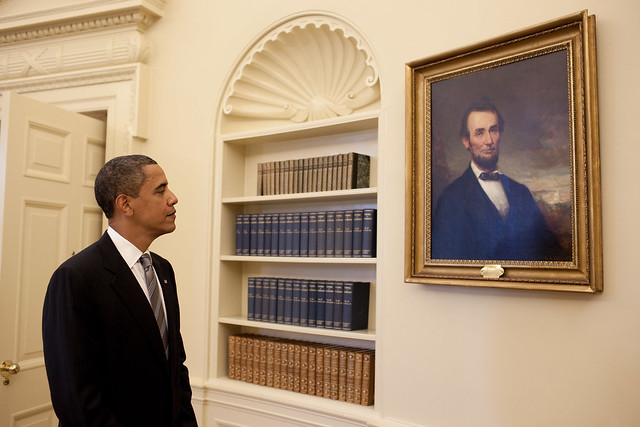
Still, as I look at his picture, it is the man and not the icon that speaks to me. I cannot swallow whole the view of Lincoln as the Great Emancipator. As a law professor and civil rights lawyer and as an African American, I am fully aware of his limited views on race. Anyone who actually reads the Emancipation Proclamation knows it was more a military document than a clarion call for justice. Scholars tell us too that Lincoln wasn't immune from political considerations and that his temperament could be indecisive and morose.
But it is precisely those imperfections--and the painful self-awareness of those failings etched in every crease of his face and reflected in those haunted eyes--that make him so compelling. For when the time came to confront the greatest moral challenge this nation has ever faced, this all too human man did not pass the challenge on to future generations. He neither demonized the fathers and sons who did battle on the other side nor sought to diminish the terrible costs of his war. In the midst of slavery's dark storm and the complexities of governing a house divided, he somehow kept his moral compass pointed firm and true.
What I marvel at, what gives me such hope, is that this man could overcome depression, self-doubt and the constraints of biography and not only act decisively but retain his humanity. Like a figure from the Old Testament, he wandered the earth, making mistakes, loving his family but causing them pain, despairing over the course of events, trying to divine God's will. He did not know how things would turn out, but he did his best.
A few weeks ago, I spoke at the commencement at Knox College in Galesburg, Ill. I stood in view of the spot where Lincoln and Stephen Douglas held one of their famous debates during their race for the U.S. Senate. The only way for Lincoln to get onto the podium was to squeeze his lanky frame through a window, whereupon he reportedly remarked, "At last I have finally gone through college." Waiting for the soon-to-be graduates to assemble, I thought that even as Lincoln lost that Senate race, his arguments that day would result, centuries later, in my occupying the same seat that he coveted. He may not have dreamed of that exact outcome. But I like to believe he would have appreciated the irony. Humor, ambiguity, complexity, compassion--all were part of his character. And as Lincoln called once upon the better angels of our nature, I believe that he is calling still, across the ages, to summon some measure of that character, the American character, in each of us today.

the essay: www.cnn.com/2005/POLITICS/06/28/obama.lincoln.tm/
related:
How newspapers covered Abraham Lincoln’s assassination 150 years ago: http://www.washingtonpost.com/blogs/style-blog/wp/2015/04/14/how-newspapers-covered-abraham-lincolns-assassination-150-years-ago/?postshare=3721429009768815
Flashback Post #1
Flashback Post #2
Flashback Post #4
Flashback Post: President and First Lady's visit to the Standing Rock Sioux Reservation
...second in a series, up to the inauguration, of some favorite President Obama posts of mine._____________________
President and First Lady's visit to the Standing Rock Sioux Reservation
watch:

Kat 4 Obama ?@Kat4Obama 15m
MT @NerdyWonka Native American dancers from 20+ reservations prepare for arrival of POTUS & FLOTUS. #PrezRezVisit pic.twitter.com/4lOywtClQC

Nerdy Wonka ?@NerdyWonka
Native American children await the arrival of POTUS and FLOTUS to the Standing Rock Sioux Reservation. #PrezRezVisit pic.twitter.com/Qrsjz1oJV8

pic.twitter.com/Wc7Gmzh2hZ
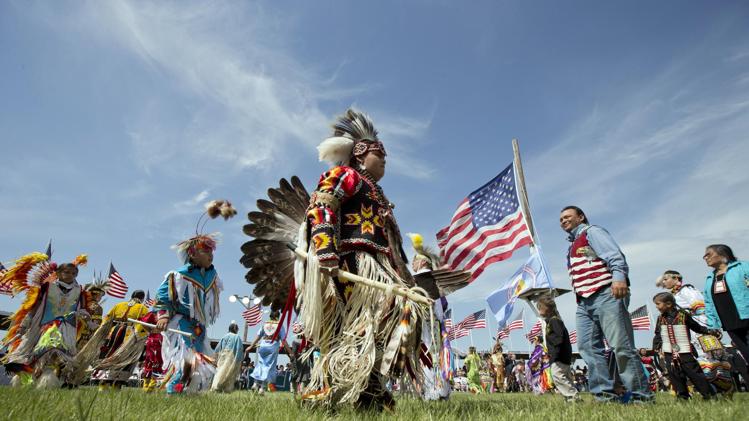
tod
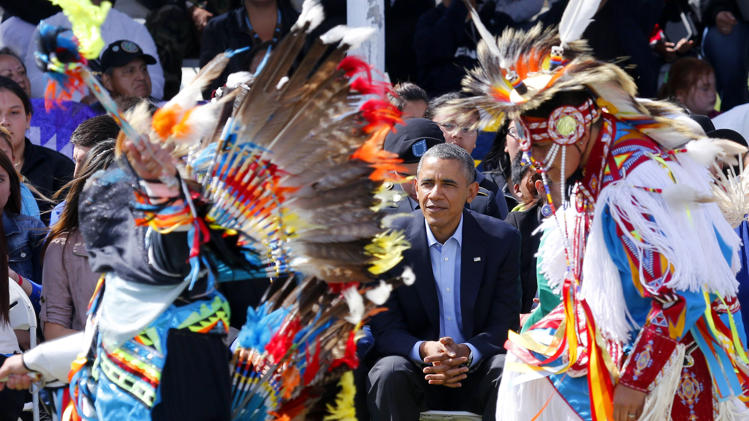
tod

Chris Stearns ?@stearnsseattle
Native youth represent w/ pride at the President and First Lady's visit to Cannon Ball Pow Wow grounds. #PrezRezVisit pic.twitter.com/ZsTVyV8tTW

WendyCarrillo ?@wendycarrillo
@BarackObama & @MichelleObama received gift of "love and honor" given to leaders. Beautiful quilt. #PrezRezVisit pic.twitter.com/I1Xo96fF9p

Team Barack Obama ?@TeamBarackObama
A Native American dancer takes a selfie with President Obama on the Standing Rock Indian Reservation #PrezRezVisit pic.twitter.com/W19txO1MT2

Ruth Hopkins ?@_RuthHopkins 37m
Check out FLOTUS Haha #ObamaSelfie pic.twitter.com/wGteJYZxTU

Nerdy Wonka ?@NerdyWonka
Pres. Obama and First Lady Michelle Obama thank Native American dancers at Cannon Ball Powwow Grounds #PrezRezVisit pic.twitter.com/wGJm5dRvY9
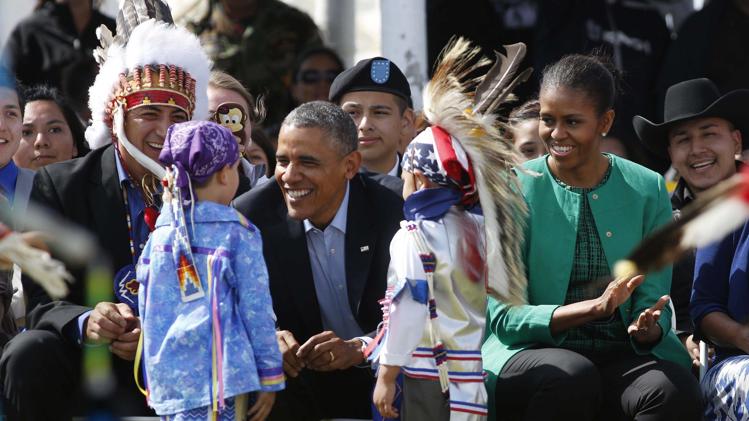
3ChicsPolitico ?@3ChicsPolitico
President Obama smiling with Native American children on the Standing Rock Sioux Reservation. #PrezRezVisit pic.twitter.com/soU2xJeWJQ


REUTERS/Larry Downing

REUTERS/Larry Downing
Nerdy Wonka ?@NerdyWonka
Historic: President Obama poses with Native American children at the Standing Rock Sioux Reservation. #PrezRezVisit pic.twitter.com/ydvRM9LSg3

Cool President Obama Posts
...first in a daily series of some favorite posts of mine, up to the inauguration.Tuesday, July 8, 2014
Josh Earnest @PressSec
AF1 landed in Denver where POTUS stopped for dinner at Wazee Supper Club with locals who wrote him a letter.
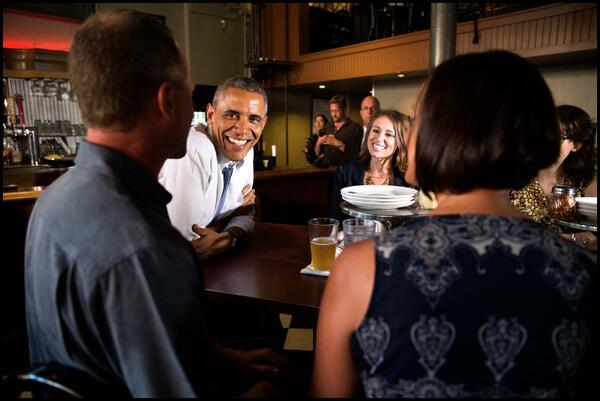
Doug Mills ?@dougmillsnyt 3m
President Obama has dinner at Wazee Supper Club with Alex Dooley, right, and her friends in Denver, CO.
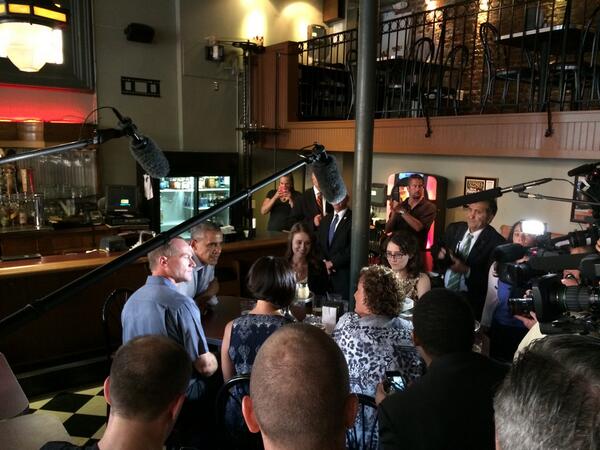
Mark Knoller ?@markknoller 3m
"We're going to have some pizza," said POTUS at dinner with 5 letter writers.

pic.twitter.com/Bg6LZkiAX9
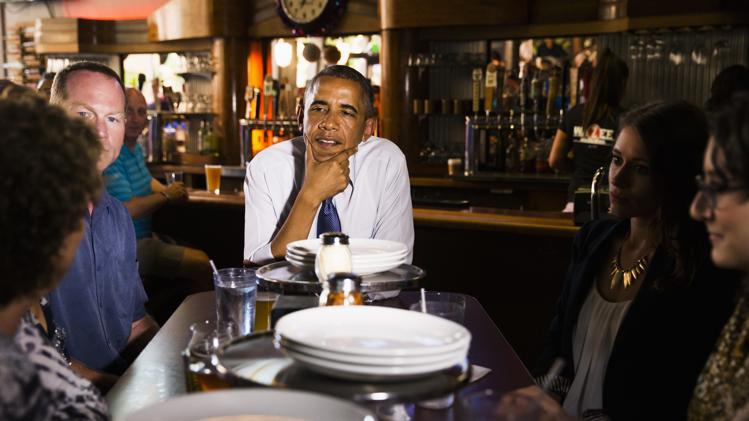
Josh Earnest ?@PressSec 3m
Gorgeous evening for a stroll down 15th Street in Denver.
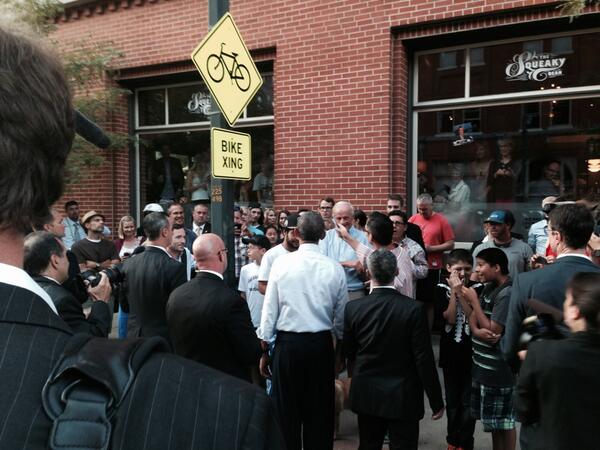

tod

tod
Sandy Phillips ?@MamaRedfield 33m
President looking great in Denver! Thanks @darrelrubin for the great photo
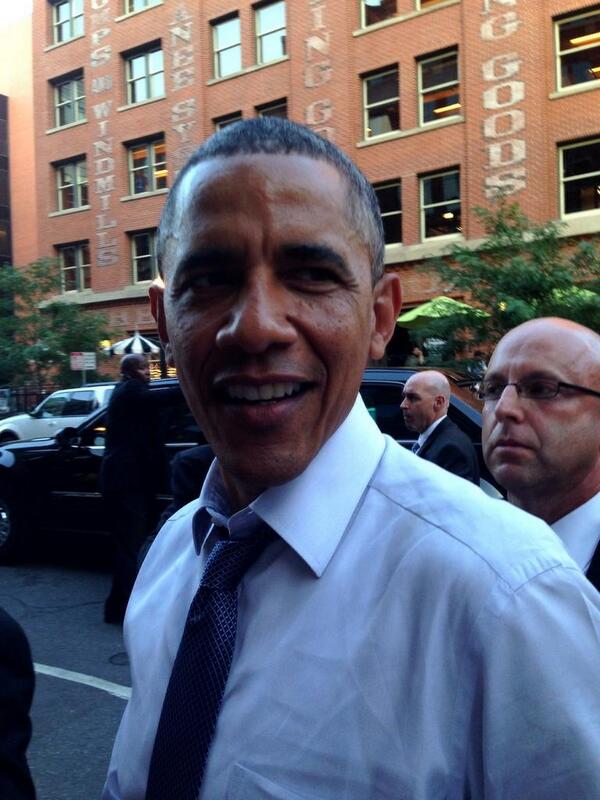
Josh Earnest ?@PressSec 5m
POTUS shoots pool with Gov Hickenlooper. Just another Tues night in Denver.

Julie Pace ?@jpaceDC 14m
In today's episode of "Obama On The Loose", he drinks a beer and plays pool...

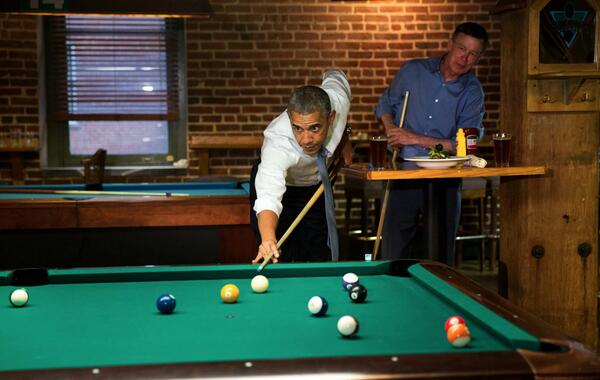
petesouza ?@petesouza 7m
Whistling along to "Brown Eyed Girl", Pres Obama shoots pool w Colorado Gov. John Hickenlooper in Denver
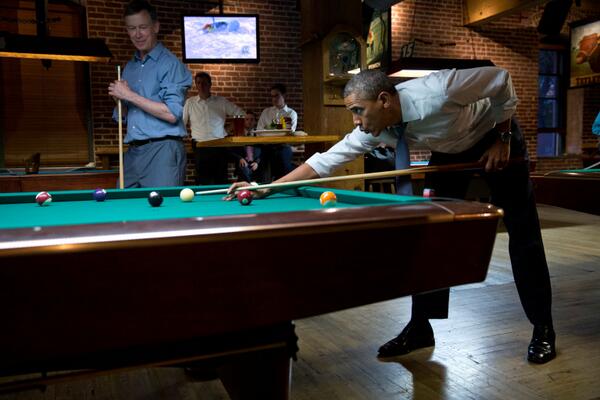
Zeke Miller ?@ZekeJMiller 54s
Pool: As the pool started to leave, Obama suddenly got hot, sinking multiple shots and winning the game. "Did you record that?" Obama asked

Mark Knoller @markknoller · 2h
#IllinoisSlim After sinking several balls, POTUS wanted to make sure press recorded his win.

3chicspolitico
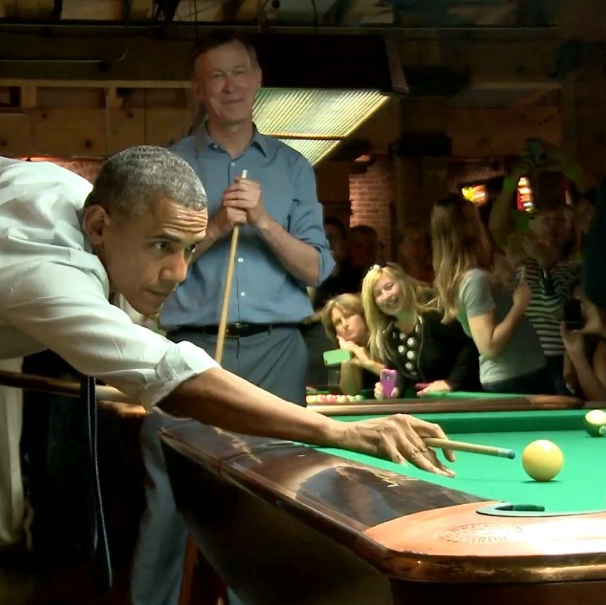
tod
Doug Mills ?@dougmillsnyt 3m
Obama has a beer with Gov. Hickenlooper at the Wynkook Brewing Company bar in Denver.

Jacquelyn Martin, AP

Neil Westergaard ?@NOWesteDenBiz 1h
Smiling Obama exits Wazee Supper Club . He looks satisfied. Good pie will do that.

Obama reacts as he is greeted by a man wearing a horse-head
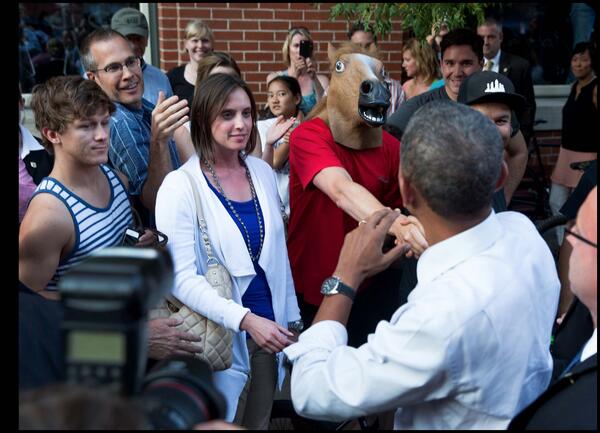
Zeke Miller ?@ZekeJMiller 16m
MT @dougmillsnyt: Obama reacts as he is greeted by a man wearing a horse-head as he walked the streets of Denver.
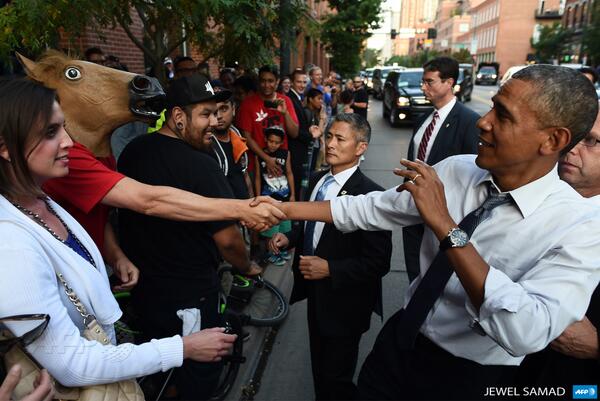
Flashback Post #2
Flashback Post #3
Flashback Post #4
Thing about accusations of misconduct
...is they tend to stick if the subject or substance reinforces or serves to corroborate widely-held views or impressions about the person accused. It's even more consequential for politicians who are regularly judged on appearances.
In Trump's case, it's entirely believable that he engaged in perverted sex acts, because of his own words about groping women; his bragging of ability to sexually exploit women based on his position; as well as his intrusions into girls and women's locker rooms while they were in a state of undress.
The standard of proof for Trump's responses to issues of sexual misconduct is understandably high for many, and he will be judged on those impressions, even more than people will judge the accuracy of claims against him.
Whether or not that's fair or right, Trump is entirely responsible for the way the public perceives these salacious accusations. So far, nothing he's said or done, in response, has removed that cloud of disbelief over his denial of the latest (albeit, unproven) allegations contained in the Russian dossier.
We shouldn't be dismissive of our power to effect change, even if the political odds are against us
I've read a few folks here who insist that we don't have any power or authority to compel a president Trump to do anything. While that notion may well be technically true, it doesn't account for the levers of our democracy which are still mostly in place, or take into account the expressed will of the majority of Americans to reject this presidency.
Politics isn't a static enterprise. It's nebulous and dynamic. Indeed, the political forces will often not bend to the will of the people without strong activism and advocacy.
That's why I would encourage each of us to embrace the authority inherent in our citizenship; in our votes and in our entreaties to our Senators and representatives; with confidence that we can positively influence the political process.
It's no secret that politicians are as politically afraid as they are politically craven. We haven't yet had our elections suspended and there are myriad opportunities to compel these politicians to listen to the voices of their constituents.
This notion that I've read here, that we're mere victims of the results of the election is hogwash. Of course, we have the courts to regulate behavior according to the law. However, it is the political class which is meant to preserve and defend Executive adherence to the law.
That check on the presidency can be switched on by a robust and challenging legislature, compelled into action by an energized and enthusiastic public. That's why it makes no sense to respond to political efforts like Eeyore, insisting that Trump is some immovable force, just because he threatens to be obstinate.
"Government of the people, by the people, for the people."
Lincoln's words at Gettysburg, affirming the principles expressed in the Declaration of Independence, aren't just ephemeral ideals. They are immutable truths, no matter who chooses to disregard them. They are made self-evident by our participation in our democracy.
At Edwardsville, Illinois, on September 11, 1858, Abraham Lincoln said:
"If the Almighty Ruler of Nations, with his eternal truth and justice, be on your side of the North, or on yours of the South, that truth and that justice will surely prevail, by the judgment of this great tribunal, the American people. By the frame of the government under which we live, these same people have wisely given their public servants but little power for mischief; and have, with equal wisdom, provided for the return of that little to their own hands at very short intervals. While the people retain their virtue and vigilance, no administration, by any extreme of wickedness or folly, can very seriously injure the government in the short space of four years. "
I wrote about this over a decade ago, and I believe my words are still relevant:
____We must care enough to involve ourselves in every instigation of democracy which confronts us. Our government is a reflection of everything we choose to neglect and every cynical impulse we reflect. Bill Clinton once said that "cynicism is a luxury."
Those in power who are motivated by greed will show up every day to collect their share, and ours as well. Can we afford to turn away and let all of the negative influences have the floor to themselves?
We have to come to grips with our individual responsibility to vigilance. We have to show up every day to make certain the government is representing all of the people; not just the corporate few who show up every day to collect our money. They will always fill the halls of Congress with their favors, bribes, and obstruction.
As my old friend, Guy Washington used to say, "Good always leaves, but bad comes to stay."
Through our virtue and our vigilance we must continue to advocate and petition our government to work for peace - here in the United States and around the world - with our voices, with our written appeals and protests, and with our actions.
Through our virtue and our vigilance we must keep ourselves informed about those issues and concerns which we entrust to the bidding of those in Congress; and we must thoroughly involve ourselves in the process of resolving those issues and concerns in tandem with our legislators by challenging ourselves to read, watch and listen; with a respect and a desire for understanding of differing views and opinions in our deliberation and debate.
Through our virtue and our vigilance we must, in our respect for democracy, value and protect the right to vote. With our full participation in the voting process we promote respect for our nation and each other, and help ensure an equal chance for representation for all of our citizens in the deliberations of our government. Our vote is the instrument of our collective conscience and our warrant to the realization of our freedom, our liberty, and our well-being.
Through our virtue and our vigilance we must challenge our government, ourselves, and one another, to act with more mercy and compassion as we marshal our resources to aid communities; to alleviate poverty, hunger, and want, here at home and around the world.
We must challenge ourselves to provide for the health needs of all of those who fall ill or injured in this country; to reach out to other countries to assist in the halting of the effects of deadly, infectious diseases and other illnesses; to provide full support and access for those with disabilities and handicaps.
We must challenge our government to make certain that there is adequate, safe, affordable housing for all; to provide emergency aid and assistance for our country; and when needed around the world, distributing these resources and this assistance in an equitable manner.
Through our virtue and our vigilance we must demand that our government promote and practice respect for the environment in our own lands and with respect for the sovereignty of those lands which don't belong to us. We must maintain these values as we protect the ground, water, and the air against pollution and abuse, by government, from industry, or from individuals.
We must challenge our government and ourselves to advocate and enforce these values; through the regulation of industry and of individuals; through enactment and enforcement of environmental laws; by our stewardship and expansion of those lands we recognize and designate as vital to the preservation of our ecosystem, to wildlife, and to the safety of the citizens of our communities. We must foster in our government a respect for the preservation of the balance of all of nature and its right to coexist with humanity without risk of devastation, destruction, or disruption, or neglect.
Through our virtue and our vigilance we must foster and nurture our respect for each other; in the sharing of our burdens; in our willingness to make reasonable compromises; in our awareness and responsiveness to the needs and concerns of the least fortunate among us. We must foster and nurture our respect for each other in the acceptance and appreciation of our differences- not merely to tolerate them- but to explore, celebrate and learn from our different backgrounds, our different abilities, our diverse heritages and nationalities, and our many different religions and beliefs.
Through our virtue and our vigilance we must challenge our government, and ourselves, to be humble; in our words and in our actions; in our acceptance of our mistakes; to admit when we act wrongfully as nations and individuals; to bend ourselves to judgement and lend our support to justice; We must accept our limitations and learn to accept help when offered.
Through our virtue and our vigilance we must instill in our lives and encourage in the acts of our government, a faithfulness to the values of honesty, integrity, and justice. We must challenge and demand from our government, a respect for the privacy of individuals; the rights of individuals to due process of law; protection from unlawful or unreasonable surveillance and searches; protection from any actions by governments, groups, or individuals to suppress protest, dissent or disagreement.
We must challenge and demand from our government, protection from unlawful or unreasonable arrest, detention, separation or deportation; and the rights of individuals to be informed and to inform others of actions by the government or its agents to restrict, degrade, or eviscerate our life, liberty, safety, or freedom. Through our virtue and our vigilance we expect and demand protection by our government from injury, abuse, exploitation, corruption, or enslavement.
We demand protection of our natural resources from theft, abuse, or neglect, as well as, insurance against the unforseen, sometimes destructive force of nature. We demand protection and defense against workplace abuse, accident, or neglect; defense against those who would do us harm, either as individuals or as a nation; and protection from the unreasonable and unlawful excesses and tyrannies of the majorities, in our government and wherever they threaten.
Never, never let ANYONE tell you that we are not in charge of our government. Never.
When You Smile at the Falling Snow
When you smile at the falling snow,
You're likely remembering joy and beauty,
Experienced over a lifetime.
From the very first time your parents,
Bundled you up with layers of long underwear;
Woolen trousers and several pairs of socks;
Oversized sweater over a turtleneck;
All crammed inside that impossibly small snowsuit.
You remember that first misshaped snowman,
Mixed with dirt and grass, and snot;
More brown than the white ground surrounding it,
Well-dressed in Mother's good scarf you borrowed
And perfectly natty in Father's old cap.
There's hastily erected snow fort on the front lawn,
Fully fortified with a neat pile of perfect snowballs,
Smoothed over by stiffening, soaked mittens,
Too precious, maybe too deadly to actually throw.
The fort is everything; only room for friends, and you.
Was there ever a truly safe hill for sledding?
One without the sharp drop into the half-frozen creek?
A sledding hill without that fence at the end,
Or that busy street with cars whizzing by past the curb,
Threatening to drown, decapitate, or drive over you?
Soaked to the bone, soaked through seven solid layers,
Stubbornly ignoring frostbitten feet and swollen hands,
Struggling with your sled back up to the top of the hill,
Standing in line behind the big kids, you spot your sister,
Shivering from the cold; you're suddenly shivering, too.
I was able to recreate all of that winter magic, as an adult;
My own sons, layered and stuffed into impossibly small snowsuits.
We made our own dirty snowmen; sturdy snow forts;
And sledded down unsafe hills; scraping swollen knuckles;
Stubbornly shivering as we stayed too long.
It's snowing, and there's a family of deer in my suburban yard,
Taking refuge on the softer land, ground deliberately layered
With the trees' insulating debris and evergreen ground cover.
There's spirit here; they know it's safe from predators,
A perfect place to digest their food and nibble a bit more.
They startle when I open the door to scatter birdseed,
Standing perfectly still, once more, when they hear my voice,
Softly reassuring them there's no reason to run away.
They're covered with snow, and one is trying to lick it off of the other.
The snow is falling fast, and I'm smiling again.
Profile Information
Gender: MaleHometown: Maryland
Member since: Sun Aug 17, 2003, 11:39 PM
Number of posts: 85,986
